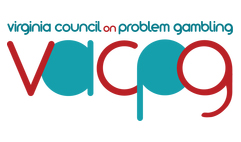Problem Gambling Links
- Virginia Council on Problem Gambling
- The National Council on Problem Gambling
- Annual Problem Gambling Awareness Month
- Gamblers Anonymous
- NCPG Holiday Campaign (Don't give lottery tickets to minors)
Gift Responsibly
Playing responsibly includes not giving tickets to anyone who is younger than 18. Under Virginia law, you need to be 18 or older to play the Lottery. It is a crime to give or sell a lottery ticket to anyone who is too young to play. Lottery tickets do make great gifts – but only if the person receiving the gift is old enough to play. Always remember to gift responsibly!
Listen to the Virginia Lottery’s public service announcement on gifting responsibly by clicking here.
Voluntary Exclusion Program
The Virginia Lottery has instituted a self-help program for individuals that wish to voluntary exclude themselves from sports betting, account based lottery as well as gaming activities administered by the Office of Charitable and Regulatory Programs and the Virginia Racing Commission. Individuals may self-exclude for a period of two-years, five-years or a lifetime. Sign up or find out more about the Voluntary Exclusion Program.
Frequently asked questions
What is problem gambling?
Problem gambling includes all gambling behavior patterns that compromise, disrupt or damage personal, family or vocational pursuits. The essential features are increasing preoccupation with gambling, a need to bet more money more frequently, restlessness or irritability when attempting to stop, "chasing" losses, and loss of control manifested by continuation of the gambling behavior in spite of mounting, serious, negative consequences. In extreme cases, problem gambling can result in financial ruin, legal problems, loss of career and family, or even suicide. For more information on criteria for gambling problems, go to www.gamblersanonymous.org.
Where can I go for help?
The Virginia Problem Gambling Helpline now also offers you the ability to chat/text online with a problem gambling counselor. Click here to get started.
Isn't problem gambling just a financial problem?
No. Problem gambling is an emotional problem that has financial consequences. If you pay all of a problem gambler's debts, the person will still be a problem gambler. The real problem is that he or she has an uncontrollable obsession with gambling.
Isn't problem gambling the result of irresponsible or weak-willed people?
No. Many people who develop problems have been viewed as responsible and strong by those who care about them. Precipitating factors often lead to a change in behavior, such as retirement or job related stress.
What kind of people become problem gamblers?
Anyone who gambles can develop problems if they are not aware of the risks and do not gamble responsibly. When gambling behavior interferes with finances, relationships and the workplace, a serious problem already exists.
Do casinos, lotteries and other types of gambling "cause" problem gambling?
The cause of a gambling problem is the individual's inability to control the gambling. This may be due in part to a genetic tendency to develop addiction, one's ability to cope with normal life stress and even one's social upbringing and moral attitudes about gambling. The casino or lottery provides the opportunity for the person to gamble. It does not, in and of itself, create the problem any more than a liquor store would create an alcoholic.
Can you be a problem gambler if you don't gamble every day?
The frequency of a person's gambling does not determine whether or not he or she has a gambling problem. Even though the problem gambler may only go on periodic gambling binges, the emotional and financial consequences will still be evident.
How much money do you have to lose before gambling becomes a problem?
The amount of money lost or won does not determine when gambling becomes a problem. Gambling becomes a problem when it causes a negative impact on any area of the individual's life.
How can a person be addicted to something that isn't a substance?
Although no substance is ingested, the problem gambler gets the same effect from gambling as someone else might get from taking a tranquilizer or having a drink. The gambling alters the person's mood and the gambler keeps repeating the behavior attempting to achieve that same effect. But just as tolerance develops to drugs or alcohol, the gambler finds that it takes more and more of the gambling experience to achieve the same emotional effect as before. This creates an increased craving for the activity and the gambler finds he or she has less and less ability to resist as the craving grows in intensity and frequency.
Are problem gamblers usually addicted to other things too?
It is generally accepted that people with one addiction are more at risk to develop another. Some problem gamblers also find they have a problem with alcohol or drugs. This does not, however, mean that if you have a gambling problem you are guaranteed to become addicted to other things. Some problem gamblers never experience any other addiction because no other substance or activity gives them the same feeling as the gambling does. There also appears to be evidence of family patterns regarding dependency as many problem gamblers report one or both parents had a drinking and or gambling problem.
How widespread is problem gambling in the U.S.?
Two million U.S. adults (1% of the population) are estimated to meet the criteria for pathological gambling in a given year. Another 4 million to 8 million (2% - 3%) would be considered problem gamblers: They do not meet the full diagnostic criteria for pathological gambling, but they meet one or more of the criteria and are experiencing problems due to their gambling behavior. Research also indicates that most adults who choose to gamble are able to do so responsibly.












